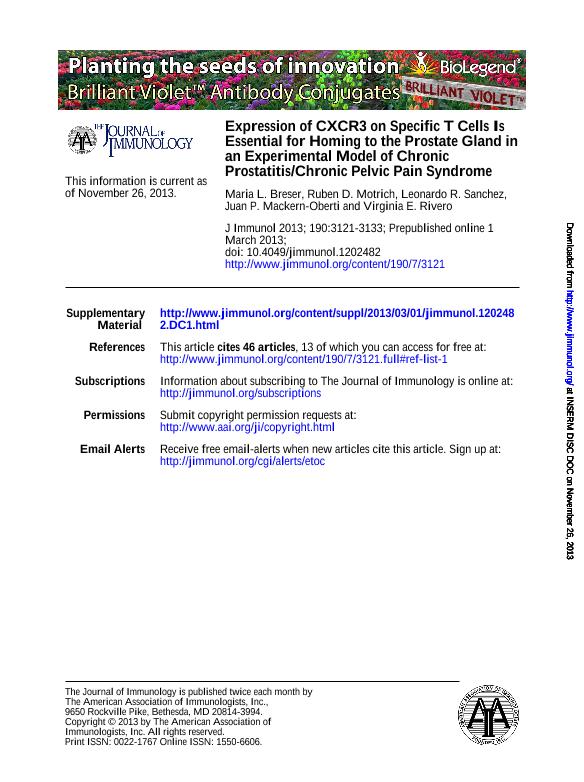Artículo
Expression of CXCR3 on specific T cells is essential for homing to the prostate gland in an experimental model of chronic prostatitis/chronic pelvic pain syndrome
Breser, Maria Laura ; Motrich, Ruben Dario
; Motrich, Ruben Dario ; Sanchez, Leonardo Rodolfo
; Sanchez, Leonardo Rodolfo ; Mackern Oberti, Juan Pablo
; Mackern Oberti, Juan Pablo ; Rivero, Virginia Elena
; Rivero, Virginia Elena
 ; Motrich, Ruben Dario
; Motrich, Ruben Dario ; Sanchez, Leonardo Rodolfo
; Sanchez, Leonardo Rodolfo ; Mackern Oberti, Juan Pablo
; Mackern Oberti, Juan Pablo ; Rivero, Virginia Elena
; Rivero, Virginia Elena
Fecha de publicación:
04/2013
Editorial:
American Association of Immunologists
Revista:
Journal of Immunology
ISSN:
0022-1767
e-ISSN:
1550-6606
Idioma:
Inglés
Tipo de recurso:
Artículo publicado
Clasificación temática:
Resumen
Experimental autoimmune prostatitis (EAP) is considered a valid model for the human disease chronic prostatitis/chronic pelvic pain syndrome. In this report, we analyzed phenotypic characteristics of T cells that gain access to the prostate and induce leukocyte recruitment in mice with different susceptibility to EAP. After EAP induction, NOD mice developed a specific cellular response characterized by a mixed Th1/Th17 pattern with specific T cells mainly expressing CXCR3 that infiltrated and damaged the prostate. In contrast, BALB/c mice, as well as NOD-IFN-g2/2, exhibited only Th17 cells mainly expressing CCR6 that were not capable of infiltrating the prostate gland. Adoptive transfer experiments of T cells from NOD or NOD–IFN-g2/2 mice to NOD-SCID recipients showed that only T cells from NOD mice successfully infiltrated the prostate. However, after “in vitro” or “in vivo” treatment with rIFN-g, T cells from NOD–IFN-g2/2 mice became capable of homing to the prostate and induced leukocyte recruitment. Chemokine levels in prostate tissue from NOD mice showed increased expression levels of CXCR3 ligands. Additional experiments using adoptive transfer of sorted CXCR3+ CD3+ T cells or administrating a CXCR3 antagonist treatment confirmed these previous results. Altogether, our results demonstrate that the expression of CXCR3 on effector T cells is essential for their homing to the prostate gland in EAP. CXCR3 emerges as a potential therapeutic target to control chronic prostatitis/ chronic pelvic pain syndrome.
Palabras clave:
Prostatitis
,
Inflammation
,
T Cell Homing
,
Chemokine Receptors
Archivos asociados
Licencia
Identificadores
Colecciones
Articulos(CIBICI)
Articulos de CENTRO DE INV.EN BIOQUI.CLINICA E INMUNOLOGIA
Articulos de CENTRO DE INV.EN BIOQUI.CLINICA E INMUNOLOGIA
Citación
Breser, Maria Laura; Motrich, Ruben Dario; Sanchez, Leonardo Rodolfo; Mackern Oberti, Juan Pablo; Rivero, Virginia Elena; Expression of CXCR3 on specific T cells is essential for homing to the prostate gland in an experimental model of chronic prostatitis/chronic pelvic pain syndrome; American Association of Immunologists; Journal of Immunology; 190; 7; 4-2013; 3121-3133
Compartir
Altmétricas



